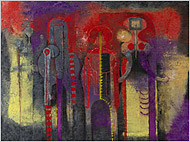Archives
30/10: Why men and women argue differently...
Ran into an interesting article on timesonline.co.uk. The article talks about why men and women argue differently. Have a read. It is very interesting.
In Gapun, a remote village on the Sepik River in Papua New Guinea, the women take a robust approach to arguing. In her pithy new book The Myth of Mars and Venus, Deborah Cameron reports an anthropologist's account of a dispute between a husband and wife that ensued after the woman fell through a hole in the rotten floor of their home and she blamed him for shoddy workmanship. He hit her with a piece of sugar cane, an unwise move that led her to threaten to slice him up with a machete and burn the home to the ground.
At this point he deemed it prudent to leave and she launched into a kros - a traditional angry tirade directed at a husband with the intention of it being heard by everyone in the village. The fury can last for up to 45 minutes, during which time the husband is expected to keep quiet. This particular kros went along these lines: "You're a f****** rubbish man. You hear? Your f****** prick is full of maggots. Stone balls! F****** black prick! F****** grandfather prick! You have built me a good house that I just fall down in, you get up and hit me on the arm with a piece of sugar cane! You f****** mother's ****!"
Such a domestic scene may be familiar to some readers, but for most of us arguing with our partners is not quite such an explosive business; except, perhaps, when discussing who is most responsible for a navigational hiccup on the way to lunch at the home of an old flame of our partner's, or getting to the bottom of who left the ****** ******* cap off the **** ******* toothpaste for the third ****** ******* time this ****** ******* week.
Human beings argue about everything from adultery to Zionism and we do so in different styles, whether we are submissive, passive, aggressive, abusive, abusive-passive, aggressive-abusive, submissive-aggressive or submissive-passive-aggressive-abusive.
But are there any broad differences between the sexes in the way that we argue? US research into marital stress on the heart has thrown up an intriguing finding about the way some are prone to "self-silencing" during arguments. The research by Elaine D. Eaker, published in Psychosomatic Medicine, found that more men than women had a tendency to bottle up their feelings during confrontations with their partners.
Tim Smith is a psychology professor at the University of Utah, whose own research has found indications that women's heart health is affected adversely by quarrels and men's when they feel they are losing control. There are clear indications, he says, that it is a male tactic to withdraw from arguments. "Women, on average, are more often in the role of the managers of relationship matters. They are often in the position of bringing up and pursuing things they would like to change. This is seen in wives making a request and pursuing it and husbands withdrawing and pulling back. The more of it a couple displays the weaker their relationship future is."
John Gray, whose Men are from Mars, Women are from Venus is one of the most successful self-help books of all time, explains this male withdrawal process thus: "To avoid confrontation Martians may retire into their caves and never come out. This is like a cold war. They refuse to talk and nothing gets resolved." He says that it is "passive aggressive behaviour" and Martians are "afraid of confrontation and would rather lie low and avoid talking about any topics that may cause an argument".
Edward, 37, a freelance writer, says he is a practitioner of the withdrawal method. "I'm useless at arguing. I have things that bother me but when I finally say something I am too slow to win the argument. I'll make an accusation about what I know is a pattern of behaviour that is hurtful for me. But then I'll get asked to come up with examples and I'll freeze. I don't recall them. I can only launch in when I have all the evidence to back up my argument ready to use. I suppose I'm too lazy to do that. I think women, on the whole, are more practised at arguing, or more interested."
Gray's thesis is that the differences and disagreements between men and women don't hurt so much as the ways in which we communicate them. "Most couples start out arguing about one thing and within five minutes are arguing about the way they are arguing." The pattern he identifies involves a woman raising an issue, often asking rhetorical questions rather than being direct. The man, rightly or wrongly, hears disapproval. Men, according to Gray, are in great need of approval.
Feeling challenged, the man becomes focused on being right and forgets to be loving. The woman then becomes upset by his unloving delivery and defends herself from his sharpened expressions. Her tone becomes mistrusting and rejecting. Gray says that we need to remember that our partner objects not to what we are saying but how we are saying it.
"Most arguments escalate when a man begins to invalidate a woman's feelings and she responds to him disapprovingly." When a woman shares her frustration men go on the defensive. "Every cell in a man's body reacts with a list of explanations and justifications designed to explain away her upset feelings."
Christine Northam, a counsellor with Relate, the marriage-counselling service, points to An Introduction to Family Therapy, by R. Dallos and R. Draper, which cautions that "despite these differences between men and women, especially in the supposed concern that women have with feelings, analysis of everyday conversations does little to bear this out."
But Northam adds that in her experience of many years of helping couples, the way men and women have been conditioned affects the way that they argue and that it true that men have a greater tendency to withdraw. One popular phrase among psychologists is "the distancer and the pursuer", says Northam. "One of you wants to sort it and the other one backs off: ‘I will shut down and I won't deal with you.' That does lead to a lot of tension in the relationship and you end up not addressing what you need to be talking about.
"I do talk with men who find it very, very difficult to engage with their feelings. Women say: ‘He won't respond to me, he won't listen, he thinks he's right all the time.' Men have been socialised to think that they know what they are talking about. I know it's changing, it's really changing a lot. But that's still around: ‘Men are powerful and what I say goes.' Women internalise that too. It's not just the blokes. Women get very frustrated, hysterical, when trying to get their point across because it seems that it just falls on the dead ground all the time. What they are saying is not being picked up and acknowledged and dealt with.
"Certainly the younger men that I see tend to be much more willing to engage with their feelings, keen to understand them and talk about them. Older men find it slightly trickier or more than slightly trickier."
She adds that women are also capable of the withdrawal technique. "Oh yes, women are quite powerful at doing that as well. They change the subject or rubbish it or cry. Crying is a good one and then the poor man says: ‘Oh my god, she's in tears'."
We all recognise that scenario. "I don't argue a lot but I do cry a lot," says Sarah, 32, an advertising executive. "I'll say something harsh to him and he'll say something probably only equally harsh back and then I'll be in floods of tears. I call my friend and she says: ‘Where are you?' ‘In the loo.' And then when I finally come out after half an hour he's just watching TV as if nothing has happened."
Christine Northam says that another major difference between the way men and women argue is that "men tend to resort to aggression very quickly, whereas women are more manipulative and try and present a problem and go on and on about it rather than being succinct. Men get angry and feel defensive and shameful very quickly, then they get aggressive. In the worst-case scenario they get violent. Men tend to probably become more aggressive more quickly overall - but not every time by any means.
"Aggression I would say is more easy to recognise when blokes are arguing. Men want to be more powerful. All couple disagreements are about power and control: who's going to come out on the top. You have to be ever so grown up to start negotiating and that's what couple counselling is about - helping to negotiate instead of arguing all the time."
She says that men are also more prone to decline to take their partner's concerns seriously. "They say: ‘She's going on again. Oh, here we go.' They tend to trivialise. I'm afraid it goes back to our patterning; the stereotypical stuff we have all been fed. We are very much influenced by the way our parents were or even our grandparents. We all like to think we are terribly different but we are not. It stays inside you and so the way you do emotions is learnt in your family. To look at them, understand them and then make a conscious decision that you will do it differently is very grown up."
Deborah Cameron, the Rupert Murdoch Professor of Language and Communication at the University of Oxford, believes that the differences between the way men and women argue are overstated. "The idea that men and women differ fundamentally in the way they use language to communicate is a myth," she says. She is sceptical of research that examines what people say in staged situations, or that relies on people to report on their own relationships. "I do not believe research based on questions about how people argue that require them to be better observers than almost all people are of their own linguistic behaviour."
Even if people were to be wired up and recorded over a long time to capture spontaneous arguments, it is hard to draw conclusions about differences between the sexes, she says, because people argue differently in different cultures and situations, as her account of the approach of the women of New Guinea suggests. "It depends which men and women you observe," she says. The idea that there is no difference between the arguing styles of a woman in the West, her granny and a woman in a tribal village in Africa is "absolute rubbish".
"You can't generalise about men and women. Cultural differences are much bigger than gender differences. You need to specify what culture and what community within that culture." She is scathing of John Gray's work, which she says "ignores the difference that context and subject matter make, and is massively generalised and exaggerated".
She says that "it is intriguing to people that there are differences, but people use it as a prop". But while Cameron is probably right that it is extremely hard to prove in a scientific way that there are differences between men and women in the way that they argue, it is also unlikely that anyone will ever be able to show conclusively that there are no differences. So as long as men and women are still arguing, researchers and writers and psychobabblers will continue to argue about how they are arguing.
And on that note I am going to withdraw from this particular discussion.
Source: http://www.timesonline.co.uk/tol/life_and_style/men/ article2764731.ece
24/10: Scary but true. Credit card information hacked and leaked into Google Search.
Here's an interesting situation. A hacker manages to steal credit card information from various sources on the Internet. However, he places this information online in the format of the text file. Google ends up indexing all the names, credit card numbers, their addresses, etc. and can be fully searched by anyone who uses Google. Alister, a blogger, lands on this text file and uncovered a huge list of people’s names, addresses and credit card details online. He has put a blog posting that talks about his findings and recommends that each person search for their name, credit card number, etc. to ensure that it is not listed on Google. To prevent your information being hacked, the following points have been highlighted on his post: |  |
Buy online from large, reputable suppliers only.
Ideally, choose vendors in the same “jurisdiction” as you, and vendors who also sell to you offline.
Don’t buy from ugly sites.
If the site looks really ugly and clunky on the front end, it might be coded that way on the back end too. Just walk away!
Use Paypal where you can.
It’s an eBay company and gives you a safety net for online transactions. They spend millions getting it right.
Update your passwords.
You should use really good passwords, and unique ones, for your important online services like banks, hosting suppliers, government, etc. Don’t double up on them.
Buy from countries you trust.
If sounds snobbish, but if you get in trouble with a vendor who doesn’t deliver, and he’s from a country that can’t protect you in law, you’re up the creek without a strudel.
Know about phishing.
You think you know what it means, but are you up-to-date on the latest tricks and techniques? Some of them are darned convincing. So use filters and software to help you too.
For more information and to read more about his posting, please click here >>
23/10: Woman finds painting worth $1,000,000 by someone's trash.

"It’s hardly a place you would expect to find a $1 million painting.
But one March morning four years ago, Elizabeth Gibson was on her
way to get coffee, as usual, when she spotted a large and colorful abstract
canvas nestled between two big garbage bags in front of the Alexandria..."
Click here for the full article >>
16/10: Father of 67 wants to marry again
By DIAA HADID, Associated Press Writer
EMEK HEFER, Israel - With eight wives and 67 children, Shahadeh Abu Arrar has given new meaning to the term "family man."
Abu Arrar, 58, is a member of Israel's impoverished Bedouin Arab community. But even in a traditional society where men commonly have several wives and many children, Abu Arrar is exceptional.
"I'm thinking about a new wife, No. 9," he told the Israeli daily Yediot Ahronot in a recent interview. "There are many women who wish to marry me and there is no lack of women. I never had a problem with such things."
Abu Arrar, whose oldest child is 37, was photographed by the newspaper in a long Bedouin robe and head cover, surrounded by a dozen of so of his kids.
During a visit to his multistory home in central Israel, The Associated Press spotted 17 of the children milling about, dressed in bright red, blue and green-embroidered Palestinian dresses and headscarves. Four veiled women, including two who said they were his wives, sat on the porch peeling vegetables.
While Islam allows Muslim men to have four co-wives, it is a custom in Bedouin society to flout the already-generous ruling - and an Israeli ban on polygamy - by marrying women one at a time, divorcing them and marrying others, experts on Bedouin culture said.
Culturally, it's understood that the renounced wives are still married to Abu Arrar, the experts said.
It's unclear how Abu Arrar supports his massive family. Camels, goats and a cow were grazing on his property. Yediot said he also receives about $1,700 (euro1,200) in government handouts each month.
According to the Israeli Interior Ministry, Abu Arrar has 53 children registered as Israeli citizens. He has 14 other children born to Palestinian wives in the West Bank and who are not eligible for Israeli citizenship, his other wives said.
Either way, his family size pales in comparison to the size of the average Israeli family: 2.3, according to the Israeli Central Bureau of Statistics.
Abu Arrar claims to remember all his children's names, and says they are split almost evenly between boys and girls. And he's still going strong.
"My first wife is my age, and today I hardly spend any time with her. Her children are big, and I leave her alone. I have younger wives to spend time with. Every night I decide which wife to be with," Abu Arrar told the newspaper. He refused to talk to an AP reporter.
Activists said Abu Arrar's story showed the urgency of raising literacy and education among women in the impoverished Bedouin community. Many are pressured into marriage or feel they have no other options beside raising children, said Khadra al-Sani, director of Sidra, a Bedouin women's rights group.
Still, Abu Arrar pales in comparison to others in the region. In August, the Emirates Today newspaper in Dubai ran a story about a one-legged 60-year-old man with 78 children from 12 wives.
Daad Abdul Rahman said he hoped to have a hundred children by 2015.
Source:http://news.yahoo.com/s/ap/20071016/ap_on_fe_st/ israel_dad_s67_kids;_ylt=AjpK6rb_MqLBG.5.5Uv34tTtiBIF
11/10: Reuters Article about a post on craigslist.com

Very interesting article on a post made on Craigslist.com.
It made it to Reuters News...
http://www.reuters.com/article/wtMostRead/idUSN0941966120071010
THIS IS THE POST THAT APPEARED ON CRAIG'S LIST
What am I doing wrong?
Okay, I'm tired of beating around the bush. I'm a beautiful
(spectacularly beautiful) 25 year old girl. I'm articulate and classy.
I'm not from New York. I'm looking to get married to a guy who makes at
least half a million a year. I know how that sounds, but keep in mind
that a million a year is middle class in New York City, so I don't think
I'm overreaching at all.
Are there any guys who make 500K or more on this board? Any wives? Could
you send me some tips? I dated a business man who makes average around
200 - 250. But that's where I seem to hit a roadblock. 250,000 won't get
me to central park west. I know a woman in my yoga class who was married
to an investment banker and lives in Tribeca, and she's not as pretty as
I am, nor is she a great genius. So what is she doing right? How do I
get to her level?
Here are my questions specifically:
- Where do you single rich men hang out? Give me specifics- bars,
restaurants, gyms
-What are you looking for in a mate? Be honest guys, you won't hurt my
feelings
-Is there an age range I should be targeting (I'm 25)?
- Why are some of the women living lavish lifestyles on the upper east
side so plain? I've seen really 'plain jane' boring types who have
nothing to offer married to incredibly wealthy guys. I've seen drop dead
gorgeous girls in singles bars in the east village. What's the story
there?
- Jobs I should look out for? Everyone knows - lawyer, investment
banker, doctor. How much do those guys really make? And where do they
hang out? Where do the hedge fund guys hang out?
- How you decide marriage vs. just a girlfriend? I am looking for
MARRIAGE ONLY
Please hold your insults - I'm putting myself out there in an honest
way. Most beautiful women are superficial; at least I'm being up front
about it. I wouldn't be searching for these kind of guys if I wasn't
able to match them - in looks, culture, sophistication, and keeping a
nice home and hearth.
* it's NOT ok to contact this poster with services or
other commercial interests
PostingID: 432279810
THE ANSWER
Dear Pers-431649184:
I read your posting with great interest and have thought meaningfully
about your dilemma. I offer the following analysis of your predicament.
Firstly, I'm not wasting your time, I qualify as a guy who fits your
bill; that is I make more than $500K per year. That said here's how I
see it.
Your offer, from the prospective of a guy like me, is plain and simple a
cr@ppy business deal. Here's why. Cutting through all the B.S., what you
suggest is a simple trade: you bring your looks to the party and I bring
my money. Fine, simple. But here's the rub, your looks will fade and my
money will likely continue into perpetuity...in fact, it is very likely
that my income increases but it is an absolute certainty that you won't
be getting any more beautiful!
So, in economic terms you are a depreciating asset and I am an earning
asset. Not only are you a depreciating asset, your depreciation
accelerates! Let me explain, you're 25 now and will likely stay pretty
hot for the next 5 years, but less so each year. Then the fade begins in
earnest. By 35 stick a fork in you!
So in Wall Street terms, we would call you a trading position, not a buy
and hold...hence the rub...marriage. It doesn't make good business sense
to "buy you" (which is what you're asking) so I'd rather lease. In case
you think I'm being cruel, I would say the following. If my money were
to go away, so would you, so when your beauty fades I need an out. It's
as simple as that. So a deal that makes sense is dating, not marriage.
Separately, I was taught early in my career about efficient markets. So,
I wonder why a girl as "articulate, classy and spectacularly beautiful"
as you has been unable to find your sugar daddy. I find it hard to
believe that if you are as gorgeous as you say you are that the $500K
hasn't found you, if not only for a tryout.
By the way, you could always find a way to make your own money and then
we wouldn't need to have this difficult conversation.
With all that said, I must say you're going about it the right way.
Classic "pump and dump."
I hope this is helpful, and if you want to enter into some sort of
lease, let me know.
--------------------------
Nick Roustas
Managing Director
TD Securities Inc.
(416) 982-4800 (work)
(416) 786-1515 (mobile)
********************
NOTICE OF CONFIDENTIALITY
This communication including any information transmitted with it is
intended only for the use of the addressees and is confidential.
If you are not an intended recipient or responsible for delivering
the message to an intended recipient, any review, disclosure,
conversion to hard copy, dissemination, reproduction or other use
of any part of this communication is strictly prohibited, as is the
taking or omitting of any action in reliance upon this communication.
If you receive this communication in error or without authorization
please notify us immediately by return e-mail or otherwise and
permanently delete the entire communication from any computer,
disk drive, or other storage medium.
If the above disclaimer is not properly readable, it can be found at
www.td.com/legal
11/10: Family Day To Be Celebrated Every Third Monday Of February

QUEEN'S PARK - Premier Dalton McGuinty got back to work today on behalf of hard-working Ontario families by confirming that he would create a new statutory holiday this February called Family Day.
"There is nothing more valuable to families than time together. And yet it seems tougher than ever to find, with so many of us living such busy lives," McGuinty said.
"That's why, on the third Monday of this coming February - and every February from now on - Ontarians deserve a new statutory holiday - Family Day."
Adding Family Day to the calendar would give Ontario workers and families a total of nine statutory holidays per year, putting the province on par with Saskatchewan, Alberta and British Columbia.
In addition, although not recognized as a statutory holiday under the Employment Standards Act, the first Monday in August is observed as a civic holiday in many Ontario municipalities.
"I can think of no better way for our government to get to work than by rewarding Ontarians for all their hard work, and for their belief that when we work together, build together and dream together, there is nothing we cannot accomplish."
Premier McGuinty also pledged to continue working hard on behalf of the people of Ontario as his government begins its second mandate.
"We will continue to move forward, together. And moving forward, for our government, means that we must work as hard, care as deeply and dream as vividly as the people we are privileged to represent," he said.
"We live in the greatest province in the most blessed country in the world," said McGuinty. "We have made great progress, together, in the past four years - and we know we have more to do in the next four years."
Source: http://www.premier.gov.on.ca
04/10: Photoshop Logos throughout the years...
A brief history of photoshop logos since 1987.









And the latest E.T Edition.
